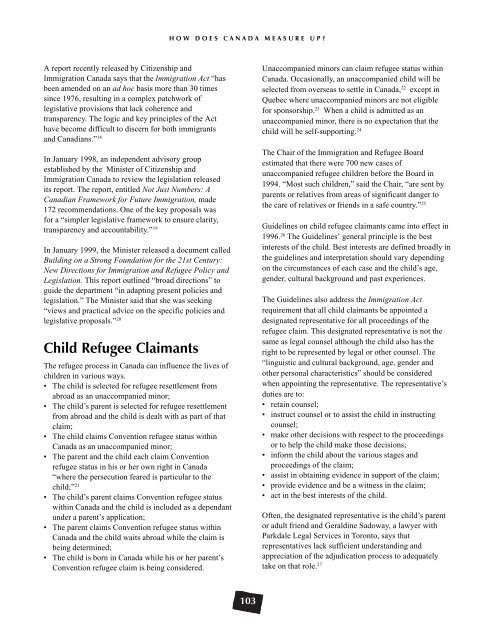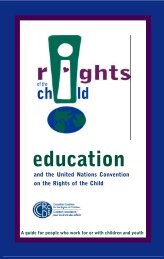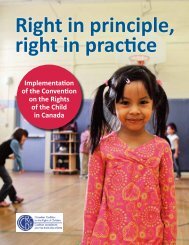Poste - Canadian Coalition for the Rights of Children
Poste - Canadian Coalition for the Rights of Children
Poste - Canadian Coalition for the Rights of Children
Create successful ePaper yourself
Turn your PDF publications into a flip-book with our unique Google optimized e-Paper software.
A report recently released by Citizenship and<br />
Immigration Canada says that <strong>the</strong> Immigration Act “has<br />
been amended on an ad hoc basis more than 30 times<br />
since 1976, resulting in a complex patchwork <strong>of</strong><br />
legislative provisions that lack coherence and<br />
transparency. The logic and key principles <strong>of</strong> <strong>the</strong> Act<br />
have become difficult to discern <strong>for</strong> both immigrants<br />
and <strong>Canadian</strong>s.” 18<br />
In January 1998, an independent advisory group<br />
established by <strong>the</strong> Minister <strong>of</strong> Citizenship and<br />
Immigration Canada to review <strong>the</strong> legislation released<br />
its report. The report, entitled Not Just Numbers: A<br />
<strong>Canadian</strong> Framework <strong>for</strong> Future Immigration, made<br />
172 recommendations. One <strong>of</strong> <strong>the</strong> key proposals was<br />
<strong>for</strong> a “simpler legislative framework to ensure clarity,<br />
transparency and accountability.” 19<br />
In January 1999, <strong>the</strong> Minister released a document called<br />
Building on a Strong Foundation <strong>for</strong> <strong>the</strong> 21st Century:<br />
New Directions <strong>for</strong> Immigration and Refugee Policy and<br />
Legislation. This report outlined “broad directions” to<br />
guide <strong>the</strong> department “in adapting present policies and<br />
legislation.” The Minister said that she was seeking<br />
“views and practical advice on <strong>the</strong> specific policies and<br />
legislative proposals.” 20<br />
Child Refugee Claimants<br />
The refugee process in Canada can influence <strong>the</strong> lives <strong>of</strong><br />
children in various ways.<br />
• The child is selected <strong>for</strong> refugee resettlement from<br />
abroad as an unaccompanied minor;<br />
• The child’s parent is selected <strong>for</strong> refugee resettlement<br />
from abroad and <strong>the</strong> child is dealt with as part <strong>of</strong> that<br />
claim;<br />
• The child claims Convention refugee status within<br />
Canada as an unaccompanied minor;<br />
• The parent and <strong>the</strong> child each claim Convention<br />
refugee status in his or her own right in Canada<br />
“where <strong>the</strong> persecution feared is particular to <strong>the</strong><br />
child;” 21<br />
• The child’s parent claims Convention refugee status<br />
within Canada and <strong>the</strong> child is included as a dependant<br />
under a parent’s application;<br />
• The parent claims Convention refugee status within<br />
Canada and <strong>the</strong> child waits abroad while <strong>the</strong> claim is<br />
being determined;<br />
• The child is born in Canada while his or her parent’s<br />
Convention refugee claim is being considered.<br />
H O W D O E S C A N A D A M E A S U R E U P ?<br />
103<br />
Unaccompanied minors can claim refugee status within<br />
Canada. Occasionally, an unaccompanied child will be<br />
selected from overseas to settle in Canada, 22 except in<br />
Quebec where unaccompanied minors are not eligible<br />
<strong>for</strong> sponsorship. 23 When a child is admitted as an<br />
unaccompanied minor, <strong>the</strong>re is no expectation that <strong>the</strong><br />
child will be self-supporting. 24<br />
The Chair <strong>of</strong> <strong>the</strong> Immigration and Refugee Board<br />
estimated that <strong>the</strong>re were 700 new cases <strong>of</strong><br />
unaccompanied refugee children be<strong>for</strong>e <strong>the</strong> Board in<br />
1994. “Most such children,” said <strong>the</strong> Chair, “are sent by<br />
parents or relatives from areas <strong>of</strong> significant danger to<br />
<strong>the</strong> care <strong>of</strong> relatives or friends in a safe country.” 25<br />
Guidelines on child refugee claimants came into effect in<br />
1996. 26 The Guidelines’ general principle is <strong>the</strong> best<br />
interests <strong>of</strong> <strong>the</strong> child. Best interests are defined broadly in<br />
<strong>the</strong> guidelines and interpretation should vary depending<br />
on <strong>the</strong> circumstances <strong>of</strong> each case and <strong>the</strong> child’s age,<br />
gender, cultural background and past experiences.<br />
The Guidelines also address <strong>the</strong> Immigration Act<br />
requirement that all child claimants be appointed a<br />
designated representative <strong>for</strong> all proceedings <strong>of</strong> <strong>the</strong><br />
refugee claim. This designated representative is not <strong>the</strong><br />
same as legal counsel although <strong>the</strong> child also has <strong>the</strong><br />
right to be represented by legal or o<strong>the</strong>r counsel. The<br />
“linguistic and cultural background, age, gender and<br />
o<strong>the</strong>r personal characteristics” should be considered<br />
when appointing <strong>the</strong> representative. The representative’s<br />
duties are to:<br />
• retain counsel;<br />
• instruct counsel or to assist <strong>the</strong> child in instructing<br />
counsel;<br />
• make o<strong>the</strong>r decisions with respect to <strong>the</strong> proceedings<br />
or to help <strong>the</strong> child make those decisions;<br />
• in<strong>for</strong>m <strong>the</strong> child about <strong>the</strong> various stages and<br />
proceedings <strong>of</strong> <strong>the</strong> claim;<br />
• assist in obtaining evidence in support <strong>of</strong> <strong>the</strong> claim;<br />
• provide evidence and be a witness in <strong>the</strong> claim;<br />
• act in <strong>the</strong> best interests <strong>of</strong> <strong>the</strong> child.<br />
Often, <strong>the</strong> designated representative is <strong>the</strong> child’s parent<br />
or adult friend and Geraldine Sadoway, a lawyer with<br />
Parkdale Legal Services in Toronto, says that<br />
representatives lack sufficient understanding and<br />
appreciation <strong>of</strong> <strong>the</strong> adjudication process to adequately<br />
take on that role. 27




